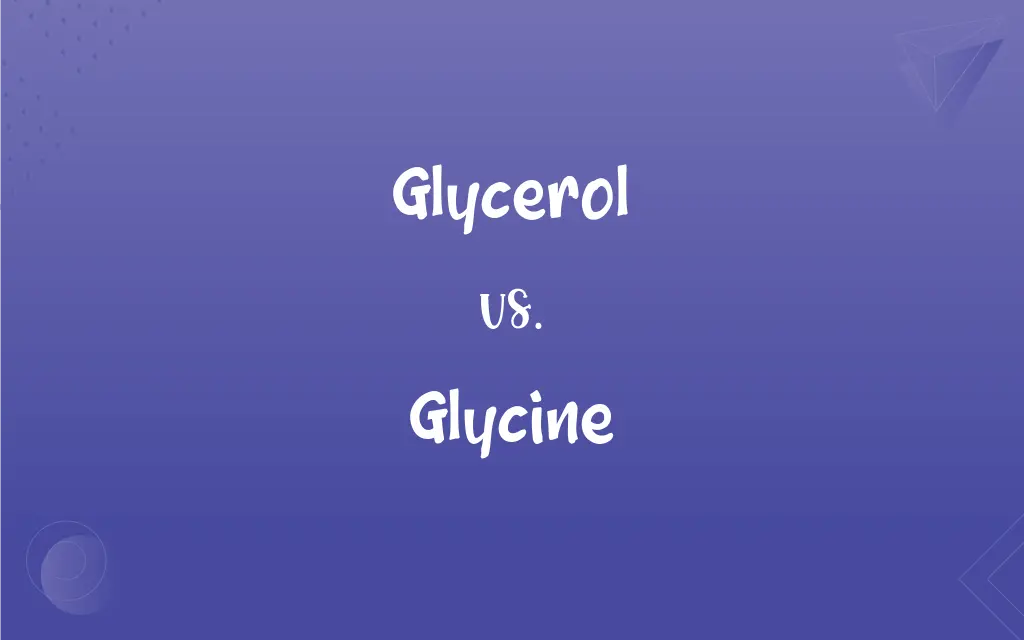Glycerol vs. Glycine: What's the Difference?
Edited by Harlon Moss || By Janet White || Updated on October 2, 2023
Glycerol is a colorless, odorless, viscous liquid used in pharmaceuticals and cosmetics, while glycine is a non-essential amino acid involved in protein synthesis.

Key Differences
Glycerol and glycine are substances integral to biochemical processes but play different roles in biology. Glycerol, a polyol compound, is recognized for its application in pharmaceutical formulations, cosmetics, and food production due to its hygroscopic properties and ability to act as a solvent. On the other hand, glycine is an amino acid, the smallest and simplest of the amino acids involved in the construction of proteins, playing a pivotal role in maintaining healthy body functions, including the construction of nucleic acids and bile acids essential for digestive and cellular processes.
The applications and characteristics of glycerol vary significantly from those of glycine. Glycerol’s versatility is showcased in the production of nitroglycerin, which is an essential component in explosives and medicines for heart diseases, exploiting its reactive nature. Meanwhile, glycine functions predominantly within the physiological realm, being vital for metabolic activities and neurotransmitter actions, serving as an inhibitory neurotransmitter in the central nervous system, hence balancing neural activities and preventing excessive excitatory actions that can be harmful.
Glycerol’s hygroscopic nature and solubility in water make it invaluable in pharmaceuticals and cosmetics, where it's utilized as a humectant, solvent, and sweetening agent. It helps in maintaining moisture levels in skin care products and improving the texture and spreadability of pharmaceutical creams. Contrastingly, glycine is crucial in the formation of collagen, promoting skin health from within, and is also used therapeutically in treating various disorders like schizophrenia and stroke, emphasizing its role in maintaining mental health and aiding in neurological recovery.
In terms of structure, glycerol has a more complex molecular structure with three hydroxyl groups, enabling its ability to form hydrogen bonds, making it miscible in water. Glycine, being the simplest amino acid, has a single hydrogen atom as its side chain, contributing to its flexibility and ability to fit into tight spaces in molecular structures, essential for initiating the formation of alpha-helices in proteins.
Both glycerol and glycine hold significant importance in their respective fields; glycerol is a multifunctional compound utilized widely in various industries for its physical and chemical properties, and glycine, being a fundamental component of proteins, is indispensable for life processes, displaying its influence in metabolic and neurological activities.
ADVERTISEMENT
Comparison Chart
Chemical Structure
Has three hydroxyl groups.
Simplest amino acid with a hydrogen side chain.
Role in Biology
Acts as a solvent and humectant in various products.
Involved in protein and nucleic acid construction.
Applications
Used in pharmaceuticals, cosmetics, and food industry.
Essential for metabolic activities and neurotransmission.
Nature
Hygroscopic and miscible in water.
Inhibitory neurotransmitter in the CNS.
Physiological Importance
Important in the formation of nitroglycerin.
Fundamental in the formation of collagen.
ADVERTISEMENT
Glycerol and Glycine Definitions
Glycerol
Forms the backbone of triglycerides in human metabolism.
In human metabolism, fats are stored as triglycerides, with glycerol forming the backbone.
Glycine
Involved in the production of nucleic acids and bile acids.
Glycine is essential for the synthesis of DNA and RNA, crucial nucleic acids in the body.
Glycerol
A byproduct of biodiesel production.
Biodiesel production yields glycerol as a valuable byproduct.
Glycine
Essential for the formation of collagen.
Without glycine, the structural integrity of collagen would be compromised.
Glycerol
A colorless, sweet-tasting, viscous liquid.
Glycerol is often used as a base for pharmaceutical formulations.
Glycine
Used therapeutically in several disorders.
Patients with certain neurological conditions may be prescribed glycine for relief.
Glycerol
Used in food and cosmetics as a solvent and humectant.
The addition of glycerol prevents the lotion from drying out.
Glycine
A non-essential amino acid involved in protein synthesis.
Glycine plays a critical role in the creation of several proteins in the body.
Glycerol
A precursor for the synthesis of nitroglycerin.
The conversion of glycerol to nitroglycerin is a key process in the production of explosives.
Glycine
Acts as an inhibitory neurotransmitter in the CNS.
The presence of glycine helps in maintaining a balance in neural activities.
Glycerol
A syrupy, sweet, colorless or yellowish liquid triol, C3H8O3, obtained from fats and oils as a byproduct of saponification and used as a solvent, antifreeze, plasticizer, and sweetener and in the manufacture of dynamite, cosmetics, liquid soaps, inks, and lubricants.
Glycine
A sweet-tasting crystalline nonessential amino acid, C2H5NO2, that is the principal amino acid occurring in sugarcane. The simplest amino acid found in protein, it is derived from the alkaline hydrolysis of gelatin and used in biochemical research and medicine.
Glycerol
(organic compound) 1,2,3-trihydroxy-propane or propan-1,2,3-triol; a trihydric alcohol
Glycine
(amino acid) A nonessential amino acid, amino-acetic acid, C2H5NO2 found in most proteins but especially in sugar cane; the simplest amino acid.
Glycerol
A syrupy sweet liquid obtained as a by-product in the manufacture of soap from animal or vegetable oils and fats; it is used as an antifreeze, a plasticizer, and a food sweetener and in the manufacture of dynamite, cosmetics etc.
Glycine
The simplest amino acid found in proteins and the principal amino acid in sugar cane
Glycerol
Same as Glycerin.
Glycine
Genus of Asiatic erect or sprawling herbs: soya bean
Glycerol
A sweet syrupy trihydroxy alcohol obtained by saponification of fats and oils
FAQs
Can glycerol be used as a sweetener?
Yes, glycerol has a sweet taste and can be used as a sweetener.
Can glycine improve sleep quality?
Some studies suggest that glycine may have a positive impact on sleep quality.
What is the primary industrial use of glycerol?
It is extensively used in cosmetics, food, and pharmaceutical industries as a humectant and solvent.
Does glycine support cognitive function?
Glycine acts as a neurotransmitter and has been implicated in enhancing cognitive function.
Is glycerol involved in human metabolism?
Yes, glycerol forms the backbone of triglycerides in human metabolism.
Is glycine essential for the human body?
While glycine is non-essential, as the body can produce it, it plays crucial roles in metabolism and neurological function.
Is glycine present in collagen?
Yes, glycine is a significant component in the formation of collagen.
Can glycerol be used in explosives?
Glycerol is a precursor in the synthesis of nitroglycerin, an explosive compound.
Is glycerol safe for consumption?
Yes, glycerol is generally considered safe for consumption in food and pharmaceuticals.
Can glycine aid in muscle growth?
Glycine is involved in the synthesis of creatine, which can support muscle growth.
Can glycerol be synthesized in the laboratory?
Yes, glycerol can be synthesized in the laboratory through various chemical reactions.
Can glycerol improve skin hydration?
Yes, as a humectant, glycerol can improve skin hydration by attracting water to the skin’s surface.
Is glycine involved in DNA construction?
Yes, glycine is involved in the production of nucleic acids like DNA and RNA.
Does glycine participate in metabolic processes?
Yes, glycine is a significant player in various metabolic processes.
Can glycerol be derived from natural sources?
Yes, glycerol can be derived from natural fats and oils.
Is glycerol present in fatty acids?
Glycerol forms the backbone of triglycerides, which are types of fatty acids.
Does glycine have a role in neurotransmission?
Yes, glycine serves as an inhibitory neurotransmitter in the central nervous system.
Is glycine beneficial for mental health?
Glycine has therapeutic applications and may benefit mental health in specific conditions.
Can glycine be synthesized by the human body?
Yes, glycine is a non-essential amino acid, meaning the human body can synthesize it.
Is glycerol a byproduct of biodiesel production?
Yes, glycerol is a byproduct yielded during biodiesel production.
About Author
Written by
Janet WhiteJanet White has been an esteemed writer and blogger for Difference Wiki. Holding a Master's degree in Science and Medical Journalism from the prestigious Boston University, she has consistently demonstrated her expertise and passion for her field. When she's not immersed in her work, Janet relishes her time exercising, delving into a good book, and cherishing moments with friends and family.
Edited by
Harlon MossHarlon is a seasoned quality moderator and accomplished content writer for Difference Wiki. An alumnus of the prestigious University of California, he earned his degree in Computer Science. Leveraging his academic background, Harlon brings a meticulous and informed perspective to his work, ensuring content accuracy and excellence.































































